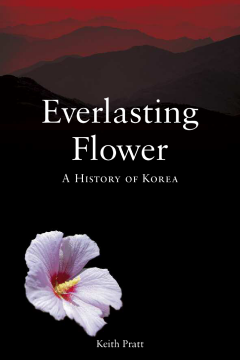
Additional Information
Book Details
Abstract
The defiant dictatorship of North Korea and the thriving democracy of South Korea may appear starkly different, but they share a complex and often misunderstood history that is ably recounted in Everlasting Flower.
Keith Pratttraverses the ancient landscapes of the Koreas, from the kingdoms of Old Choson and Wiman Choson to the present-day 38th Parallel division. The book’s engaging narrative details the wars, ruling dynasties, Chinese and Japanese imperialism, and controversial historical events such as the abuses of the Japanese occupation.
Everlasting Flower applies an equally careful eye to religious practices, dress, and food, and augments the narrative with richly illustrated pictorial essays. As the Korean peninsula assumes a prominent role in world affairs, Everlasting Flower offers an invaluable survey of Korean history and culture.
"A fascinating story of how Korea evolved over two millennia to become the economic and cultural powerhouse it is today."
— Don Baker, Centre for Korean Research, University of British Columbia
"Everlasting Flower represents a step forward in the historiography of modern Korea. . . . While it gives a good deal of attention to earlier periods, it establishes their relationship to the emergence of modern Korea in a clear and understandable way. The author has managed to maintain a consistent level of depth and detail from beginning to end, giving the text a most valuable perspective. It succeeds as a history text for classroom use, as a general read for the armchair historian, and as a thoughtful review for the specialist."
— Professor Donald N. Clark, Department of History, Trinity University
"[A] full and fascinating study of Korean history."
— John Gittings, The Guardian"Everlasting Flower is significant because for the first time there is a single book which surveys the whole cultural history of Korea. . . . Pratt brings a comparative perspective to his discussion of Korean history which gives the book a breadth often missing in other works. . . . The book is important because of its substantial discussion of cultural developments in North Korea since 1945, perhaps the best single source on the subject." — James H. Grayson, History
"Pratt takes an avowedly cultural slant on Korean history . . . . This will make the book attractive not only to those with an interest Korean history but also to readers studying the art history of the region, as the author's deep knowledge of Korean visual arts, literature, and particularly music shine through in many places. . . . His sensitive and balanced approach to nationalism, keeping one eye firmly on the present interpretations and significance of Korea's history, means that the book will give readers much insight into how contemporary Koreans understand their past. . . . Pratt's book is a very solidly researched, well-balanced, and enjoyable read peppered with glimpses of wit and personal observation. It will be a valuable introduction to Korean history for undergraduates, non-academics and more specialist readers alike--and one that will hopefully inspire further reading." — Owen Miller, Bulletin of the School of Oriental and African Studies
"A stimulating account of Korean history. . . . The book represents the observations of a person who has devoted much of his life to understanding Korean culture. Consequently, it has much to offer anyone interested in Korea, specialists as well as the general reader." — Michael J. Seth, Korean Studies
Keith Pratt is professor emeritus in the Department of East Asian Studies at Durham University in the United Kingdom. He is the author or coauthor of numerous books and articles on Korea, including Korea: A Historical and Cultural Dictionary.
